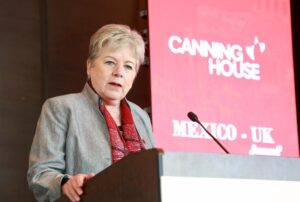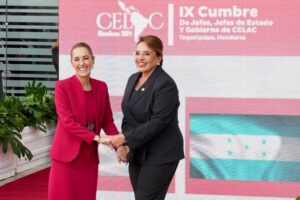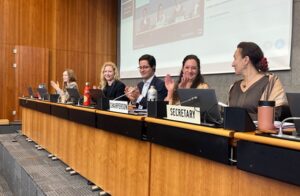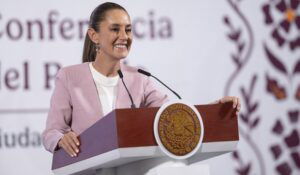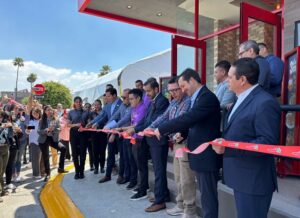La DG Okonjo-Iweala dice que los Miembros de la OMC deben mantenerse unidos ante el riesgo de fragmentación
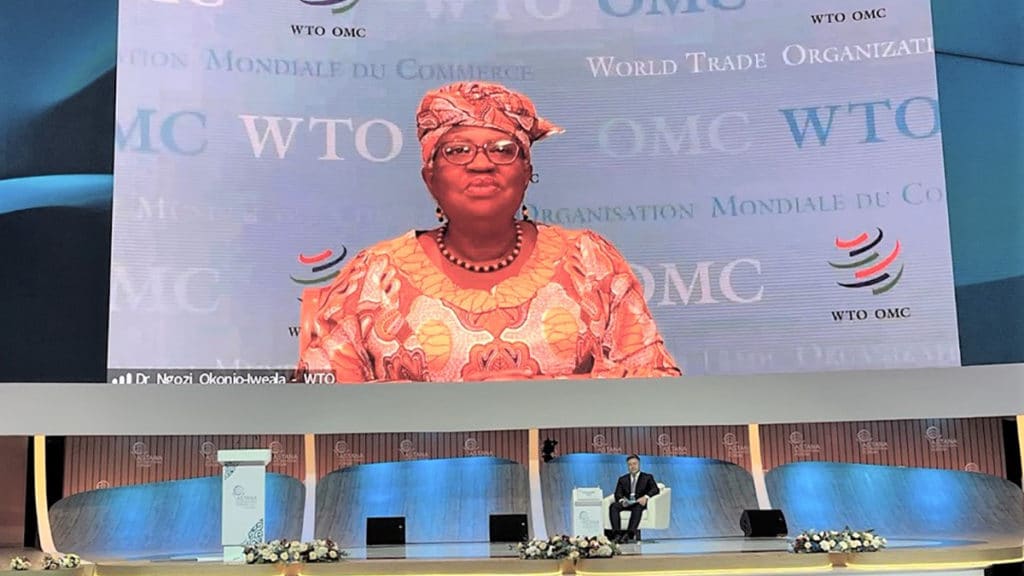
El 9 de junio, la Directora General Ngozi Okonjo-Iweala instó a los Miembros de la OMC a luchar contra la fragmentación del sistema mundial de comercio, ya que esta tendría un efecto devastador en la economía mundial. En un discurso pronunciado en una reunión especial de alto nivel del Foro Internacional de Astaná, la Directora General recordó los principales resultados de la Duodécima Conferencia Ministerial de la OMC (CM12) celebrada en junio de 2022 y destacó las prioridades de los Miembros de cara a la Decimotercera Conferencia Ministerial, que se celebrará en febrero de 2024. También puso de relieve los procesos de adhesión a la OMC en los que estaban participando varios países de Asia Central.
(de momento sólo en inglés)
“This is a very uncertain time in the world,” said the Director-General. “The world economy is growing slowly. There are very serious geopolitical tensions. We have problems of the global commons like climate change, and we have the war in Ukraine. So there are a number of uncertainties that are facing the global trading system.”
The Director-General expressed concern about the existing geopolitical tensions between major traders, which are leading to an increasing narrative of decoupling into two separate economic blocs, deglobalization and the risk of fragmentation of the global trading system. She noted that this situation arises from the serious vulnerabilities in global supply chains and the trading system as a result of the COVID-19 pandemic and the war in Ukraine. She said there is a need to be very cautious as having a world trading system divided into two or more blocs could be very costly for the entire global economy.
WTO economists, she recalled, have estimated that if the world were to break up into trading blocs it would mean a 5% loss in real global GDP in the longer term — much more than the loss that the OECD countries suffered during the financial crisis of 2008-09, which was 3.5% of GDP. “It is like saying that you lose the entire economy of Japan from the global economy,” she said.
The Director-General considered it a good sign that G7 economies in their May summit in Hiroshima, Japan, stated in the final communiqué that they are not decoupling or turning inwards but recognizing that economic resilience requires de-risking and diversifying.
Looking ahead, the Director-General drew attention to future opportunities for trade. She underlined the fast-growing pace of trade in services and, in particular, digitally delivered services — a sector that is growing at 8% per year compared to trade in goods that is growing at 5.6% per year. “It is clear that the future of trade is services. It is digital, it is green and it should be inclusive,” she stated.
She underlined the importance of the plurilateral negotiations at the WTO — open to all members. In particular, she highlighted efforts to conclude an agreement on e-commerce, expressing the hope that in spite of the challenges facing members involved in the talks, they will be able to set rules aimed at underpinning digital trade in the coming year.
Acknowledging that uncertainty and vulnerabilities are leading some countries to take more protectionist measures, the Director-General stressed that “the way to go is not to retreat from trade, look inwards and become more protectionist” but “to maintain the stability and openness of the global trading system, which has delivered benefits for the past 75 years, lifting a billion people out of poverty.”
She said the video played at the beginning of the event was a clear example of how important it has been for a country like Kazakhstan to become a member of the WTO. She noted that among the MC13 deliverables are the accessions of Timor-Leste and Comoros.
Uzbekistan, Turkmenistan and Azerbaijan are currently negotiating accession and the WTO is very eager to see them join as these countries are in “a part of the world that is very critical to the global economy,” said the Director-General. “We would like to see those members succeed because accession to the WTO also enables countries to do necessary reforms that will underpin growth and development.”
As the first anniversary of MC12 draws nearer, the Director-General recalled the successful outcome of the conference, which produced the so-called “Geneva package”, a culmination of efforts by WTO members to provide concrete trade-related responses to important challenges.
The Director-General highlighted the outcomes reached on fisheries subsidies, the WTO response to the pandemic, food insecurity, e-commerce and other issues. These outcomes demonstrate that the multilateral trading system can respond to some of the most pressing challenges of our time, she said. However, she noted that while “we are proud of the successes, we must not rest on our laurels.”
We must not lose sight of what should be achieved before and at MC13, starting by the ratification of the Fisheries Subsidies Agreement adopted at MC12, she said. “Normally, it takes a long time to ratify an agreement at the WTO. This time we cannot afford to do that because of the sustainability issues … If we are serious about saving the oceans and the fisheries, we need to be fast. The objective is to do it in 18 months. I hope we can do it,” she said.
On WTO reform, she referred to the ambitious target of improving and enhancing the negotiating, monitoring and dispute settlement functions of the organization. “Members would like to see all those functions strengthened so that the WTO can be responsive to challenges of the 21st century,” said the Director-General. “We have pledged by 2024 to complete that reform and we hope that by MC13 there will be a significant attempt to really deliver this reform.”
In addition, she referenced the ongoing negotiations on agriculture, the extension of the MC12 TRIPS Decision to therapeutics and diagnostics, the moratorium on customs duties on electronic transactions and the graduation of least-developed countries from LDC status as well as talks on investment facilitation for development.
Timur Suleimenov, MC12 Chair and First Deputy Chief of the President’s Administration of Kazakhstan, thanked the Director-General for her participation in the Astana International Forum. “It greatly enriched our discussions and reaffirmed the importance of collective efforts in addressing the challenges faced by the multilateral trading system,” he said.
A recording of the event can be found here.

